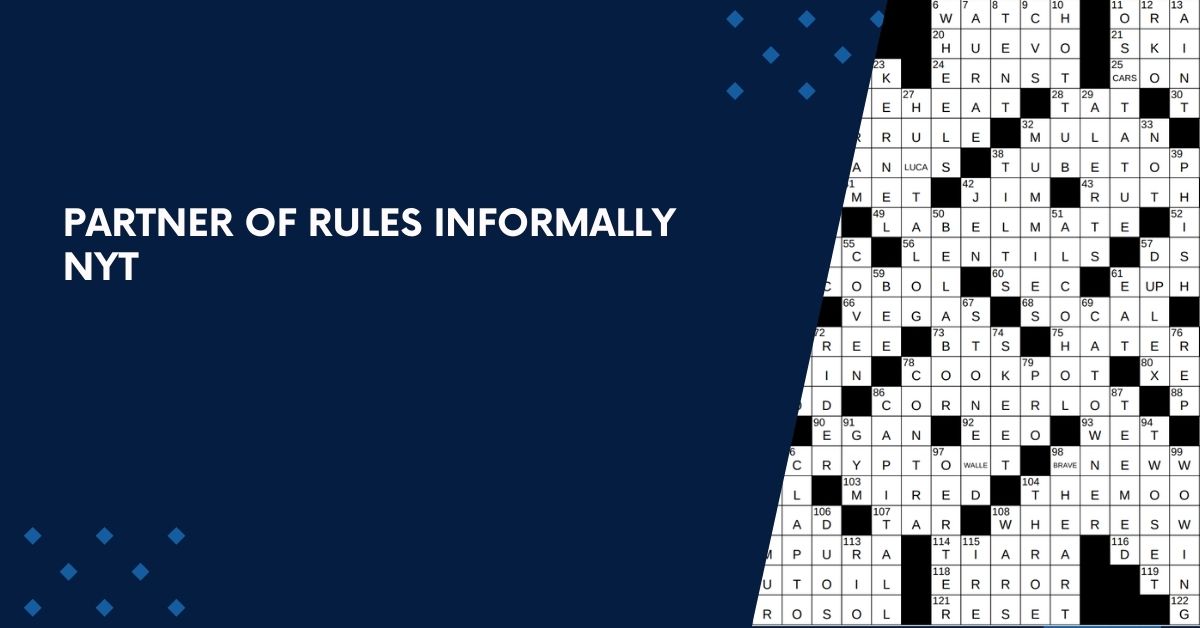Partner Of Rules Informally Nyt – Mastering the NYT Clue!
When I saw “partner of rules informally nyt” in the NYT crossword, “regs” instantly came to mind. It was satisfying to see how this abbreviation fit perfectly into the puzzle. It reflected how everyday language can be cleverly and effortlessly used in crosswords, enriching the experience.
The clue “partner of rules, informally” leads to the abbreviation “regs.” This casual shorthand for regulations is commonly used in everyday language. Its clever presence in the puzzle showcases how informal terms can fit seamlessly into crossword clues.
The clue “partner of rules informally nyt” in the crossword reveals “regs,” a common abbreviation for regulations. It’s exciting to see how this shorthand seamlessly fits into the puzzle. Such moments highlight the clever ways informal language is woven into crossword clues.
What is the clue partner of rules informally nyt ?
The clue “partner of rules informally nyt” in the crossword refers to the abbreviation “regs.” This shorthand stands for regulations, a term frequently used in legal and organizational contexts.
The use of “regs” condenses the term into a brief and familiar form, making the clue concise and accessible. It’s a clever way to incorporate common language into puzzles, such as in the NYT crossword.
Incorporating “regs” into crossword puzzles illustrates how everyday abbreviations can be effectively used as clues. It reflects the clever integration of informal language into puzzles, enhancing the solving experience.
This approach makes the crossword, including clues like “partner of rules, informally,” both engaging and relevant to real-world usage, bridging the gap between casual language and puzzle-solving.
How does “regs” fit into the context of crossword puzzles?
“Regs” fits into crossword puzzles, such as in the clue “partner of rules informally nyt” as an effective abbreviation for the term “regulations.” Crossword clues often use shorthand or abbreviated terms to create more challenging and engaging puzzles.
In this context, “regs” provides a concise and familiar way to refer to regulations, making it a perfect fit for a crossword clue that seeks to test solvers’ knowledge and vocabulary.
The inclusion of “regs” in a puzzle showcases how crossword creators use everyday language to craft clues. By incorporating common abbreviations, like “regs,” puzzles become more relatable and accessible to solvers.
This clever use of informal terms not only adds to the puzzle’s challenge but also enhances its connection to real-life language usage.
Why is it interesting to see everyday shorthand like “regs” used in crosswords?
Seeing everyday shorthand like “regs” used in crosswords, such as the clue “partner of rules informally nyt,” is interesting because it bridges the gap between casual language and the puzzle format.
It demonstrates how common abbreviations are cleverly employed to create concise and engaging clues. This use of familiar terms makes the puzzle feel more relevant and relatable to solvers.
Additionally, incorporating shorthand like “regs” adds a layer of complexity and challenge to the puzzle. It highlights the skill of crossword constructors in using informal language effectively, making the solving process both stimulating and enjoyable.
This blend of everyday language, as exemplified by “regs,” with puzzle-solving keeps the experience fresh and engaging for solvers.
What role does informal language play in creating engaging crossword clues?
- Relatability: Informal language makes clues more relatable and familiar to solvers, enhancing their connection to the puzzle.
- Accessibility: Using everyday terms and abbreviations ensures that clues are easier to understand and solve.
- Engagement: Clever use of informal language adds a layer of ingenuity, making the solving process more enjoyable.
- Familiarity: Incorporating common language bridges the gap between casual conversation and crossword-solving.
- Appeal: Informal terms increase the overall appeal of the puzzle by reflecting real-life language usage.
How can solvers benefit from encountering everyday shorthand in crossword clues?
- Problem-Solving: Everyday shorthand often provides straightforward clues, helping solvers apply logical thinking.
- Pattern Recognition: Familiar abbreviations help solvers recognize patterns and solve similar clues more efficiently in future puzzles.
- Memory: Repeated exposure to common shorthand reinforces memory and recognition skills for solving other puzzles.
- Contextual Understanding: Abbreviations offer context clues, making it easier to infer the correct answers based on common usage.
- Puzzle Variety: Incorporating everyday shorthand adds variety to puzzles, keeping them fresh and interesting.
- Skill Development: Regular use of familiar abbreviations can help develop and refine solving strategies and techniques.
What strategies can solvers use to remember common abbreviations found in crosswords?
- Practice Regularly: Regularly solving crosswords helps reinforce familiar abbreviations and their meanings.
- Create a Reference List: Maintain a personal list of common abbreviations and their definitions for quick reference.
- Study Crossword Glossaries: Use resources or glossaries that list frequently used abbreviations in crosswords.
- Learn Abbreviation Patterns: Recognize patterns in how abbreviations are used in clues, such as common letter combinations or categories.
- Play Crossword Apps: Use crossword-solving apps or online tools that provide hints and explanations for abbreviations.
- Join Crossword Communities: Participate in forums or groups where solvers discuss and share abbreviation tips and strategies.
- Use Mnemonics: Create memory aids or associations to help remember specific abbreviations and their meanings.
How does the use of shorthand affect the overall theme of a crossword puzzle?
The use of shorthand in crossword puzzles can enhance the overall theme by providing concise and clever clues that fit seamlessly into the puzzle’s design. Abbreviations like “regs” allow constructors to create clues that are both challenging and thematically consistent.
This brevity helps maintain the puzzle’s flow and keeps solvers engaged with a streamlined approach to solving.
Additionally, shorthand can add a layer of sophistication to the theme, especially when it complements other wordplay elements. It can also reflect the puzzle’s theme by integrating familiar abbreviations relevant to the topic.
Overall, using shorthand enriches the thematic experience, making the puzzle more cohesive and enjoyable for solvers.
FAQs:
1. Why is “regs” an effective choice for a crossword clue?
“Regs” is effective because it’s a familiar abbreviation for regulations, making the clue concise and recognizable. It fits well within the crossword format, adding both challenge and clarity.
2. Why is it important for crossword clues to use familiar abbreviations?
Familiar abbreviations make clues easier to understand, solving puzzles more efficiently and enhancing the experience.
3. How can solvers identify if a clue uses shorthand?
Solvers can look for abbreviations or familiar terms that are commonly used in everyday language, especially those often seen in puzzles.
4. How do constructors ensure abbreviations are fair in puzzles?
Constructors use well-known abbreviations and balance them with other types of clues to ensure fairness.
5. What are some examples of other shorthand used in crosswords?
Examples of common shorthand in crosswords include “Dr.” for Doctor and “TV” for television. Other examples are “Ft.” for feet and “USA” for the United States.
Conclusion:
In conclusion, the use of shorthand like “regs” in crossword puzzles adds challenge and relatability. Incorporating familiar abbreviations creates clues that are concise and engaging, enhancing the solver’s experience.
This clever use of informal language bridges everyday conversation and puzzle-solving, making puzzles more enjoyable and accessible.
Read more:






